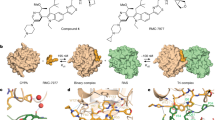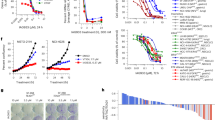Abstract
The arotinoid Ro 40-8757 was previously shown to inhibit the growth of a variety of human cancer cell lines derived from breast, lung and uterus. In view of the high incidence of human digestive cancers, and the slow progress in the development of new therapy, we examined in this paper several combinations between the new arotinoid Ro 40-8757, 5-fluorouracil (5FU) and interferon alpha-2a on the growth of nine human cancer cell lines derived from the gastrointestinal and pancreatic system. Half-maximal inhibition of cell proliferation by Ro 40-8757 was observed at concentrations ranging between 0.18 and 0.57 microM, and increased up to 4.7 microM in retinoid-resistant CAPAN 620 pancreatic cells. All-trans-retinoic acid was 70 times less potent. The sensitivity of HT29-5FU-resistant colonic cells was similar to that observed in the parental cells, suggesting an action independent of pyrimidine metabolism. Ro 40-8757 did not induce any differentiation on HT29 cells, as suggested by ultrastructural analysis. The arotinoid did not interact with receptor signal transduction pathways under the control of serum components, such as growth factors as half-maximal inhibiton of growth was similar in HT29-S-B6 cells cultured in the absence or presence of serum. Cell cycle analysis showed that Ro 40-8757 was not acting at a phase-specific transition in HT29 cells and, accordingly, did not induce overexpression of the protein kinase C (PKC)alpha isoform, or conversion of hyperphosphorylated p105 Rb into hypophosphorylated forms. However, the arotinoid induced significant accumulation of the dephosphorylated, active form of the tumour-suppressor protein. Combinations of Ro 40-8757 with 5FU and interferon alpha 2a resulted in an additive but not synergistic antiproliferative action in HT29 cells. Our data support the interest in Ro 40-8757 as a potent anti-cancer drug, especially in combination therapy with 5FU and interferon, in gastrointestinal and pancreatic cancers, where new active therapeutic modalities are urgently needed.
This is a preview of subscription content, access via your institution
Access options
Subscribe to this journal
Receive 24 print issues and online access
$259.00 per year
only $10.79 per issue
Buy this article
- Purchase on Springer Link
- Instant access to full article PDF
Prices may be subject to local taxes which are calculated during checkout
Similar content being viewed by others
Author information
Authors and Affiliations
Rights and permissions
About this article
Cite this article
Louvet, C., Djelloul, S., Forgue-Lafitte, ME. et al. Antiproliferative effects of the arotinoid Ro 40-8757 in human gastrointestinal and pancreatic cancer cell lines: combinations with 5-fluorouracil and interferon-α. Br J Cancer 74, 394–399 (1996). https://doi.org/10.1038/bjc.1996.371
Issue Date:
DOI: https://doi.org/10.1038/bjc.1996.371
This article is cited by
-
Inhibition of oxidative phosphorylation underlies the antiproliferative and proapoptotic effects of mofarotene (Ro 40-8757) in Burkitt's lymphoma cells
Oncogene (2003)
-
Retinoids cause apoptosis in pancreatic cancer cells via activation of RAR-γ and altered expression of Bcl-2/Bax
British Journal of Cancer (2002)
-
pRb and Cdk regulation by N-(4-hydroxyphenyl)retinamide
Oncogene (2000)



